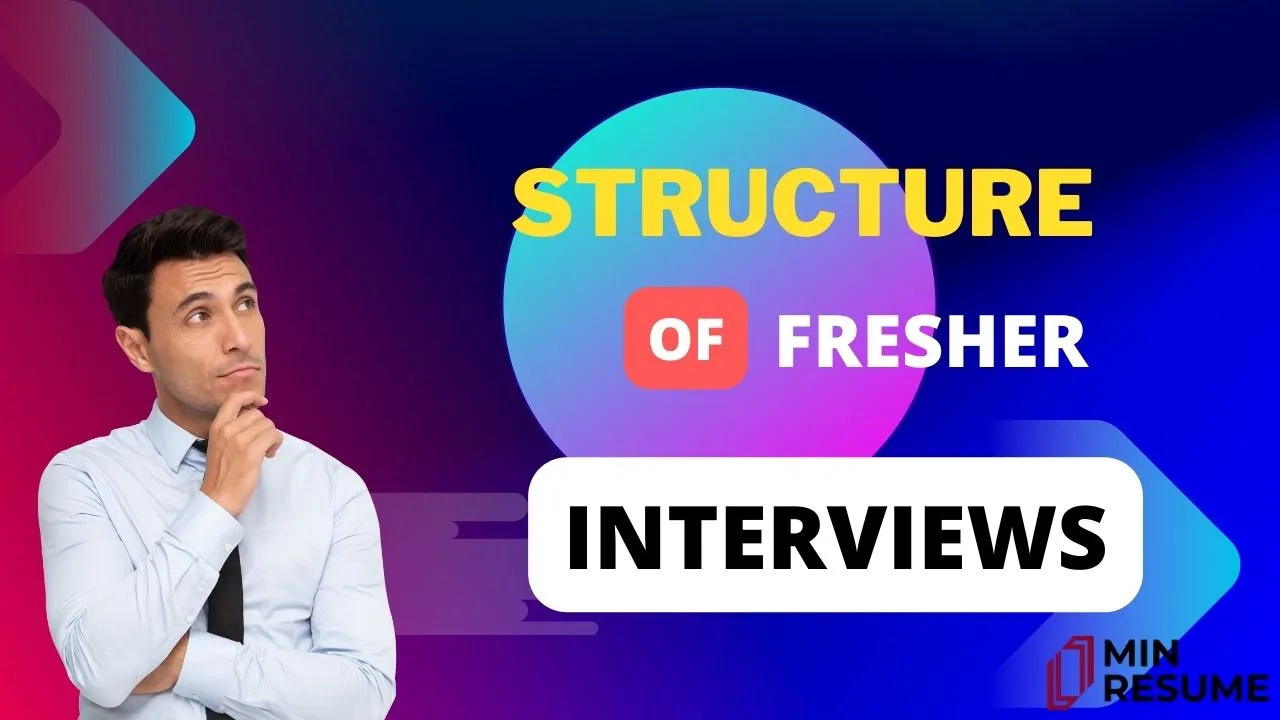Structure of Fresher Interviews

20 June 2023

Understanding the structure of interviews
The structure of interviews for freshers and the most common interview questions aim to assess a candidate's behavioral, technical/job-specific, and personal aspects. Behavioral questions focus on past experiences and actions, technical/job-specific questions evaluate knowledge and skills relevant to the role, and personal questions delve into a candidate's values, motivations, and cultural fit. By preparing well-rounded and thoughtful responses to these common interview questions, candidates can effectively showcase their abilities, experience, and suitability for the position.
In the competitive world of job interviews, being well-prepared is the key to success. Among the multitude of questions that candidates may face, there are three core categories that commonly arise: behavioral, technical/job-specific, and personal questions. These questions serve as crucial assessment tools for employers, providing insights into a candidate's abilities, expertise, and compatibility with the company culture. By understanding and mastering these common interview question types, candidates can confidently navigate the interview process and increase their chances of securing their dream job. In this comprehensive guide, we will explore each category in detail, providing valuable insights and strategies to help candidates effectively respond to the most common interview questions and showcase their unique qualities and qualifications.
Idea in Brief
The concept of the most common interview questions revolves around assessing a candidate's behavioral, technical/job-specific, and personal attributes. Employers typically ask behavioral questions to understand how candidates handle various situations, technical/job-specific questions to evaluate their expertise, and personal questions to gauge their values and fit within the company culture. By preparing for these questions, candidates can effectively demonstrate their skills, experience, and alignment with the desired qualities for the role.
Behavioral Questions
Purpose of Behavioral Questions: Behavioral questions help employers understand how you might perform in future situations based on your past experiences. By asking about real-life examples, interviewers gain insights into your problem-solving skills, interpersonal abilities, adaptability, and decision-making processes. These questions focus on your actions, rather than hypothetical scenarios, providing concrete evidence of your capabilities and behaviors.
Types of Behavioral Questions: Behavioral questions can cover a wide range of topics, such as teamwork, problem-solving, conflict resolution, leadership, and initiative. For example, you might be asked to describe a situation where you faced a challenge, how you approached it, and the outcome. Another common question could be about your experience working in a team or handling conflicts with colleagues or clients. These questions typically begin with phrases like "Can you describe a time when..." or "Tell me about a situation where..."
Responding to Behavioral Questions: When responding to behavioral questions, it's important to use the STAR method (Situation, Task, Action, Result). Start by describing the situation and providing context, then explain the task or challenge you encountered. Next, detail the actions you took to address the situation and the specific steps you implemented. Finally, conclude by sharing the positive results or outcomes achieved as a result of your actions. Remember to focus on your own contributions and emphasize the skills and qualities that align with the position you're applying for.
Technical/Job-Specific Questions
Purpose of Technical/Job-Specific Questions: The purpose of these questions is to gauge your technical knowledge and assess your ability to apply it to real-world scenarios. Employers want to ensure that you have the necessary skills and experience to handle the specific responsibilities of the role. These questions help them determine your level of expertise, problem-solving abilities, and how well you can contribute to the organization.
Types of Technical/Job-Specific Questions: The types of technical questions can vary greatly depending on the industry, role, and level of expertise required. They may cover areas such as programming languages, software development methodologies, data analysis, troubleshooting techniques, system administration, project management, or any other field-specific knowledge. For example, if you're interviewing for a software engineering position, you might be asked to explain object-oriented programming concepts, discuss your experience with specific programming languages, or describe how you have approached complex coding challenges in the past.
Responding to Technical/Job-Specific Questions: When faced with technical questions, it's important to provide clear and concise answers that demonstrate your expertise. Prepare for these questions by reviewing the job requirements and conducting research on the specific technical aspects related to the role. Be ready to discuss projects or experiences where you applied your technical skills effectively. If you don't know the answer to a particular question, it's okay to admit it, but also express your willingness to learn and your ability to quickly adapt and acquire new knowledge.
Personal Questions
Purpose of Personal Questions: Personal questions give interviewers insights into who you are as an individual and how you might fit within the organization. These questions help them assess your compatibility with the company culture, your ability to work well with others, and your alignment with the values and mission of the company. Personal questions also allow interviewers to evaluate your self-awareness, career aspirations, and overall suitability for the role.
Types of Personal Questions: Personal questions can cover a wide range of topics, including your strengths and weaknesses, your career goals and aspirations, your work style and preferences, your ability to handle challenges and adapt to change, and your approach to work-life balance. For example, you might be asked to describe a situation where you successfully managed a difficult project or to discuss your strategies for maintaining a healthy work-life balance. Personal questions often begin with phrases like "Tell me about yourself," "What motivates you in your work," or "Where do you see yourself in the future."
Responding to Personal Questions: When responding to personal questions, it's important to be authentic and genuine while keeping in mind the expectations of the role and the company culture. Take some time to reflect on your personal qualities, values, and career aspirations before the interview. Prepare specific examples or stories that highlight your strengths and demonstrate how they align with the requirements of the position. Be honest about your weaknesses but also show your willingness to learn and improve. It's important to strike a balance between showcasing your individuality and presenting yourself as a professional who can contribute effectively to the organization.
Excelling in Interviews: Navigating Common Questions with Confidence
Mastering the art of handling common interview questions is an essential skill for job seekers aiming to make a lasting impression on potential employers. Throughout this guide, we have explored three fundamental categories of interview questions: behavioral, technical/job-specific, and personal. By preparing thoughtfully crafted responses and showcasing their experiences, knowledge, and personal qualities, candidates can confidently address these questions and stand out from the competition. Remember, success lies in understanding the purpose of each question, practicing your responses, and aligning them with the specific requirements and culture of the organization. Armed with this knowledge, candidates can approach interviews with confidence, knowing that they have the skills and strategies to tackle any question that comes their way. So go forth, embrace the interview process, and showcase your true potential to land the job of your dreams.

